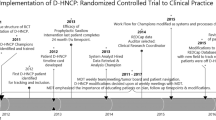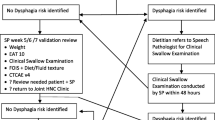Abstract
Purpose
Dysphagia is a common and debilitating side effect for head and neck cancer (HNC) patients undergoing radiotherapy (RT) with or without chemotherapy ([C]RT) and is associated with nutritional and emotional comorbidities. Emotional sequelae and distress are also known to affect carers of HNC patients. A weekly, joint speech pathology/dietetic (SP/DN) service-delivery model has been employed to manage swallowing/nutritional and associated emotional issues during (C)RT. This study aimed to conduct a service evaluation of the weekly SP/DN clinical model.
Methods
Cross-sectional sampling of core service metrics and perceptions of key stakeholders (70 HNC patients, 30 carers, and 10 clinicians) were collated from the Metro South Radiation Oncology Service in Brisbane, Australia. Data from each source was examined separately and then triangulated.
Results
An average of 28 patients (SD = 5.54) attended SP/DN appointments per week, with 58 % reporting swallowing and/or nutritional issues. Distress was reported by 27 % of patients and 30 % of carers. Clinicians felt able to adequately identify and manage swallowing and nutrition 90 % of the time but only 10 % of the time for distress. Seventy-six percent of scheduled SP/DN sessions were perceived as necessary by either patients, clinicians or both.
Conclusions
Findings demonstrated a third of patients and their carers had a high level of distress during HNC [C]RT, supporting need for the provision of a weekly SP/DN service in a select cohort. However, the routine weekly SP/DN assessment model for all patients undergoing HNC treatment demonstrates the potential for over-servicing. Alternative service-delivery models warrant further evaluation.
Similar content being viewed by others
References
Langendijk JA, Doornaert P, Verdonck-de Leeuw IM, Leemans CR, Aaronson NK, Slotman BJ (2008) Impact of late treatment-related toxicity on quality of life among patients with head and neck cancer treated with radiotherapy. J Clin Oncol 26(22):3770–3776
van der Molen L, van Rossman MA, Burkhead LM, Smeele LE, Hilgers FJ (2009) Functional outcomes and rehabilitation strategies in patients treated with chemoradiotherapy for advanced head and neck cancer: a systematic review. Eur Arch Otolaryngol 266:889–900. doi:10.1007/s00405-008-0817-3
Caudell JJ, Schaner PE, Meredith RF, Locher JL, Nabell LM, Carroll WR, Magnuson JS, Spencer SA, Bonner JA (2009) Factors associated with long-term dysphagia after definitive radiotherapy for locally advanced head-and-neck cancer. Int J Radiat Oncol Biol Phys 73(2):410–415
Isenring E, Zabel R, Bannister M, Brown T, Findlay M, Kiss N, Loeliger J, Johnstone C, Camilleri B, Davidson W, Hill J, Bauer J (2013) Updated evidence-based practice guidelines for the nutritional management of patients receiving radiation therapy and/or chemotherapy. Nutr Diet 70:312–324
Gillespie MB, Brodsky MB, Day TA, Lee FS, Martin‐Harris B (2004) Swallowing-related quality of life after head and neck cancer treatment. Laryngoscope 114(8):1362–1367
McQuestion M, Fitch M, Howell D (2011) The changed meaning of food: physical, social and emotional loss for patients having received radiation treatment for head and neck cancer. Eur J Oncol Nurs 15(2):145–151
Nguyen NP, Frank C, Moltz CC, Vos P, Smith HJ, Karlsson U, Dutta S, Midyett FA, Barloon J, Sallah S (2005) Impact of dysphagia on quality of life after treatment of head-and-neck cancer. Int J Radiat Oncol Biol Phys 61:772–778
Semple CJ, Dunwoody L, George Kernohan W, McCaughan E, Sullivan K (2008) Changes and challenges to patients’ lifestyle patterns following treatment for head and neck cancer. J Adv Nurs 63(1):85–93
Verdonck‐de Leeuw IM, Eerenstein SE, Van der Linden MH, Kuik DJ, de Bree R, Leemans CR (2007) Distress in spouses and patients after treatment for head and neck cancer. Laryngoscope 117(2):238–241
Nund RL, Ward EC, Scarinci NA, Cartmill B, Kuipers P, Porceddu SV (2014) The lived experience of dysphagia following non-surgical treatment for head and neck cancer. Int J Speech Lang Path 16(3):282–289
Nund RL, Ward EC, Scarinci NA, Cartmill B, Kuipers P, Porceddu SV (2014) Carers’ experiences of dysphagia in people treated for head and neck cancer: a qualitative study. Dysphagia 29(4):450–458
Manne S, Badr H, Kashy DA (2012) A longitudinal analysis of intimacy processes and psychological distress among couples coping with head and neck or lung cancers. J Behav Med 35(3):334–346
Precious E, Haran S, Lowe D, Rogers S (2012) Head and neck cancer patients’ perspective of carer burden. Br J Oral Maxillofac Surg 50(3):202–207
Girgis A, Lambert S (2009) Caregivers of cancer survivors: the state of the field. Cancer Forum 33(3):164–167
National Comprehensive Cancer Network (2012) NCCN Clinical practice guidelines in oncology: head and neck cancers version 1.2012. http://www.nccn.org/professionals/physician_gls/pdf/head-and-neck.pdf. Accessed 19 March 2015
Lazenby M (2014) The international endorsement of US distress screening and psychosocial guidelines in oncology: a model for dissemination. J Natl Compr Cancer Netw 12(2):221–227
Borras JM, Albreht T, Audisio R, Briers E, Casali P, Esperou H, Grube B, Hamoir M, Henning G, Kelly J (2014) Policy statement on multidisciplinary cancer care. Eur J Cancer 50(3):475–480
Allied Health Professionals Office of Queensland (2012) Discussion paper: allied health staffing in Queensland Health Cancer Care Services. Queensland Health, Brisbane
Health Workforce Australia (2012) The national cancer workforce strategy. http://www.hwa.gov.au/work-programs/workforce-innovation-and-reform/national-cancer-workforce-strategy. Accessed 19 March 2015
Roe JW, Carding PN, Rhys-Evans PH, Newbold KL, Harrington KJ, Nutting CM (2012) Assessment and management of dysphagia in patients with head and neck cancer who receive radiotherapy in the United Kingdom–a web-based survey. Oral Oncol 48(4):343–348
Krisciunas GP, Sokoloff W, Stepas K, Langmore SE (2012) Survey of usual practice: dysphagia therapy in head and neck cancer patients. Dysphagia 27(4):538–549
Lawson NR, Ward EC (2014) Patient support and multidisciplinary management. In: Head and Neck Cancer: Treatment, Rehabilitation, and Outcomes. 2nd edn. Plural Publishing, San Diego, CA, pp 447-492
Maclean J, Ward E, Findlay M, Rees G (2013) Dysphagia and nutritional management in Australia and New Zealand head and neck cancer centers. Dysphagia 28(4):601–601
Riddle B, Davidson W, Elliott R, Balsillie F, Porceddu SV (2005) Collaborative management of acute side effects for head and neck cancer patients receiving radiotherapy. Asia–Pac. J Clin Oncol 1(Suppl):A18
Platteaux N, Dirix P, Dejaeger E, Nuyts S (2010) Dysphagia in head and neck cancer patients treated with chemoradiotherapy. Dysphagia 25(2):139–152
Basch E, Jia X, Heller G, Barz A, Sit L, Fruscione M, Appawu M, Iasonos A, Atkinson T, Goldfarb S (2009) Adverse symptom event reporting by patients vs clinicians: relationships with clinical outcomes. J Natl Cancer Inst 101(23):1624–1632
Meyer F, Fortin A, Wang CS, Liu G, Bairati I (2012) Predictors of severe acute and late toxicities in patients with localized head-and-neck cancer treated with radiation therapy. Int J Radiat Oncol Biol Phys 82(4):1454–1462
Poulsen MG, Riddle B, Keller J, Porceddu SV, Tripcony L (2008) Predictors of acute grade 4 swallowing toxicity in patients with stages III and IV squamous carcinoma of the head and neck treated with radiotherapy alone. Radiother Oncol 87(2):253–259
Wilson JA, Carding PN, Patterson JM (2011) Dysphagia after nonsurgical head and neck cancer treatment patients’ perspectives. Otolaryngol Head Neck Surg 145(5):767–771
Patterson J, Wilson JA (2011) The clinical value of dysphagia pre-assessment in the management of head and neck cancer patients. Curr Opinion Otolaryngol Head Neck Surg 19(3):177–181
Bultz BD, Carlson LE (2006) Emotional distress: the sixth vital sign-future directions in cancer care. Psychol Oncol 15(2):93–95
National Comprehensive Cancer Network (2014) Distress management NCCN clinical practice guidelines in oncology. https://www.nccn.org/store/login/login.aspx?ReturnURL=http://www.nccn.org/professionals/physician_gls/pdf/distress.pdf. Accessed 19 March 2015
American Speech-Language-Hearing Association (2007) Scope of practice in speech language pathology. www.asha.org/policy. Accessed 19 March 2015
Speech Pathology Australia (2003) Scope of practice in speech pathology. http://www.speechpathologyaustralia.org.au/library/Core_Assoc_Doc/Scope_of_Practice.pdf. Accessed 19 March 2015
Brown T, Findlay M, Dincklage J, Davidson W, Hill J, Isenring E, Talwar B, Bell K, Kiss N, Kurmis R, Loeliger J, Sandison A, Taylor K, Bauer J (2013) Using a wiki platform to promote guidelines internationally and maintain their currency: evidence‐based guidelines for the nutritional management of adult patients with head and neck cancer. J Hum Nutr Diet 26(2):182–190. doi:10.1111/jhn.12036
Velikova G, Booth L, Smith AB, Brown PM, Lynch P, Brown JM, Selby PJ (2004) Measuring quality of life in routine oncology practice improves communication and patient well-being: a randomized controlled trial. J Clin Oncol 22(4):714–724
Wall L, Ward E, Cartmill B, Hill A (2013) Technology-assisted screening of patient-reported functional outcomes in the head and neck cancer population: what’s the evidence? Open Access Cancer 1(2):13–20
Abbott J, Teleni L, McKavanagh D, Watson J, McCarthy A, Isenring E (2014) A novel, automated nutrition screening system as a predictor of nutritional risk in an oncology day treatment unit (ODTU). Support Care Cancer 22(8):2107–2112. doi:10.1007/s00520-014-2210-7
Acknowledgments
The authors would like to acknowledge Cancer Council Queensland for their provision of funding to conduct this research. We also acknowledge Bernadette Dutton and the clinical teams across both MSROS sites for their assistance with data collection.
Author information
Authors and Affiliations
Corresponding author
Rights and permissions
About this article
Cite this article
Wall, L.R., Cartmill, B., Ward, E.C. et al. Evaluation of a weekly speech pathology/dietetic service model for providing supportive care intervention to head and neck cancer patients and their carers during (chemo)radiotherapy. Support Care Cancer 24, 1227–1234 (2016). https://doi.org/10.1007/s00520-015-2912-5
Received:
Accepted:
Published:
Issue Date:
DOI: https://doi.org/10.1007/s00520-015-2912-5




